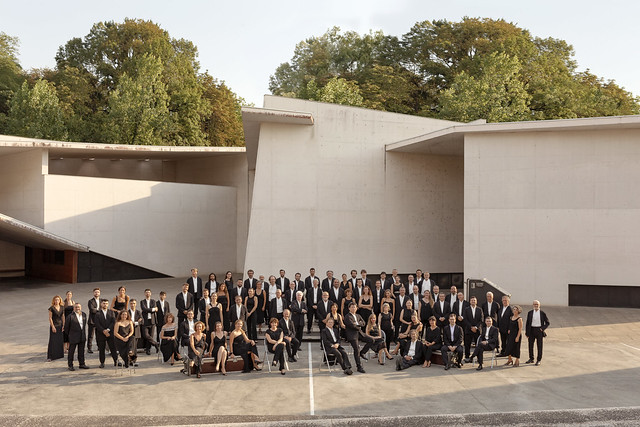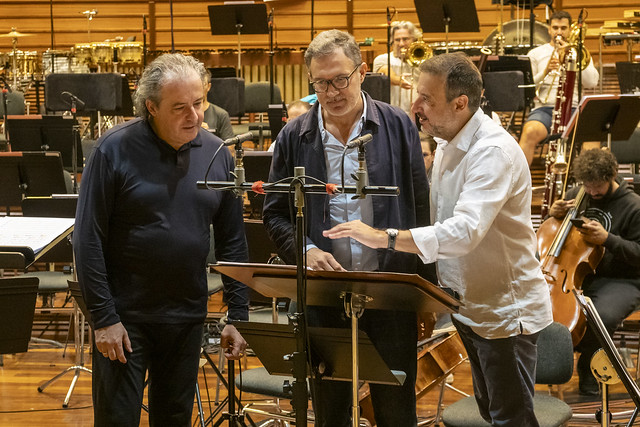The Miramon Matinées are back next Saturday 7 October

The Landarbaso Abesbatza and Euskal Herriko Gazte Abesbatza choirs, a piano recital by the great performer from Vitoria-Gasteiz, Alfonso Gómez, and many chamber ensembles with members of the Basque National Orchestra make up the 16 musical events of the new Miramon Matinées season, for which tickets are on sale.
Cadenza Taldea, comprised of fifteen musicians, will kick off the season next Saturday, 7 October at 11:00, with works by Rorem and Naulais. Tickets are on sale at 11 euros for this event and for all others in the Season.
The 2023-2024 Miramon Matinée Season will begin on Saturday, 7 October at the headquarters of the Basque National Orchestra. The matinées have been running for more than three decades as part of the Basque National Orchestra's schedule, offering a quality musical alternative. For another Season, the Miramón headquarters of the Basque National Orchestra will thus become a kaleidoscope through which to discover the thousand faces of music on Saturday mornings. The season, which since its creation has been supported by Kutxa Fundazioa, will extend until 8 June and includes a total of sixteen events.
Dozens of members of the orchestra have formed trios, quartets and quintets of multiple instrumental combinations to offer a varied repertoire ranging from the Baroque to the present day. All of this in a light, relaxed and quality format, lasting approximately one hour, which is an opportunity for the musicians to diversify, to leave their usual symphonic habitat. Bikoitz, Miramon Brass, Belharra, Aeolia Ensemble or the Cuarteto Aurora are just some of the formations that will take to the stage in Miramon.
As special guests, two important choirs from the region ‒Landarbaso Abesbatza and Euskal Herriko Gazte Abesbatza‒ and the internationally renowned pianist Alfonso Gómez from Vitoria-Gasteiz, who has previously participated in our Season Concerts, feature in this season's programme performing Ravel's famous Concerto in G Major.
All of these proposals make up an attractive menu where everyone can find their own particular treasure. This is the complete schedule of this season's Matinées:
- 7 October: Cadenza Taldea
- 14 October: Bikoitz
- 28 October: Buys Ensemble
- 18 November: Miramon Brass
- 2 December: The Flying Elephant
- 16 December: Alfonso Gómez
- 13 January: Cuarteto Ritmus
- 10 February: Landarbaso Abesbatza
- 24 February: Belharra
- 9 March: Trío Emilia
- 23 March: Aeolia Ensemble
- 13 April: Euskal Herriko Gazte Abesbatza
- 27 April: Cuarteto Aurora
- 11 May: Bost metalak
- 25 May: Xarma
- 8 June: Enescu Ensemble
Cadenza Taldea opens the Matinées Season next Saturday
The ensemble of fifteen musicians Cadenza Taldea begins the new season of the Miramon Matinées next Saturday, 7 October at 11:00, with a concert titled ‘¡Al campo!’ (‘To the countryside!’). The Basque National Orchestra percussionist Anthony Lafargue will conduct the chamber orchestra, which is made up of the following members: Ortzi Oihartzabal (violin), Esther Alba (viola), Gabriel Mesado (cello), Paloma Torrado (double bass), Hélène Billard-Alirol (flute), Pascal Laffont (oboe), Sara Zufiaurre (clarinet), François Proud (bassoon), Didier Bousquet (trumpet and cornet), Daniel Ruibal (trombone), Julien Garin (percussion), Jaime Atristain (percussion), Iván Bragado (harp) and Javier Pérez de Azpeitia (piano). All the performers are members of the Basque National Orchestra except the percussionists and the pianist.
The programme launching this new Season of the Miramon Matinées is a combination of two exceptional works that promise to captivate classical music lovers.
The first of these will be Les instruments en campagne by French composer Jerome Naulais, known for his ability to blend different styles and genres to create exciting and captivating pieces of music. This work transports us to a rural French setting, with melodies that evoke the image of green fields and a clear blue sky.
The second work, Eleven Studies for Eleven Players by the recently deceased American composer Ned Rorem, is an exploration of texture and colour in music. Rorem, one of the most influential composers of 20th century American music, was the recipient of numerous awards and accolades throughout his career. The one to be performed at this Matinée is a piece that has been acclaimed for its unique structure and its ability to evoke emotions through its notes. The work is full of contrasts that defy the listener's expectations and is a complex and emotional musical experience.
The Basque National Orchestra renews its official photo

The photography session was carried out by Álex Abril in August at the Jorge Oteiza Pelota Courts in Azkoitia.
The image also means the launch and presentation of the new attire that the orchestra musicians will wear from now on, designed and made by the Basque clothing firm Amarenak.
Coinciding with the start of the new 23/24 Season, the Basque National Orchestra is presenting its new official photo with the full orchestra. The photograph was taken by Álex Abril in the Jorge Oteiza Pelota Courts in Azkoitia, and is part of a series of images of the full orchestra and with other smaller ensembles comprised of the orchestra's musicians (see below).
This new official image has been prepared with the intention of representing the orchestra in a wide variety of contexts: the orchestra’s publications and website, media, concert seasons, festivals (Musical Fortnight, ABAO, etc.), national and international tours, etc.
Combining Oteiza's ideas with the 'pelota' tradition of Azkoitia, the pelota court complex that has been used as a setting for the orchestra was directly inspired by Oteiza himself, and designed by architect Carlos Ceballos and sculptor Antton Mendizabal. It consists of seven pelota courts that symbolise the seven Historical Territories of the Basque Country, and they are in turn linked to the different modalities of playing pelota. It is a place that combines tradition and modernity, perfectly capturing the essence of Basque culture and aligned with the character and nature of the Basque National Orchestra.
New attire for the Basque National Orchestra musicians
The image we share today also means the launch and presentation of the new attire that the orchestra musicians will wear from now on, devised and made by the Basque clothing firm Amarenak. The design was made expressly for our orchestra with the aim of modernising the musicians’ attire and progressing from the tailcoat to a more modern, comfortable and elegant outfit.
A minimalist design was chosen, where everything superfluous and bothersome was eliminated, but maintaining a traditional black and white aesthetic, albeit renewed, modern and universal. Innovative fabrics were chosen, such as recycled polyester, which also provides comfort and practicality to the musicians in their daily movements.
More information
All the pictures‘Concert & Screening’ in the Velodrome
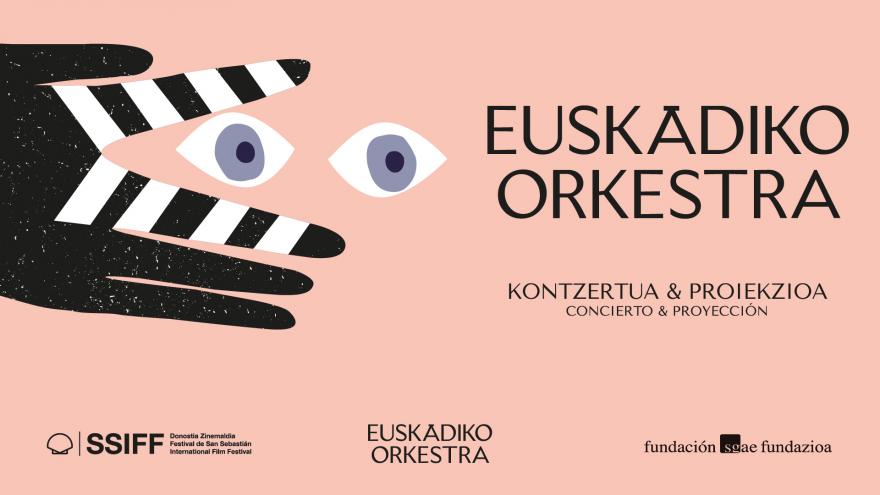
The Velodrome will host the ‘Concert & Screening’ organised by the Basque National Orchestra, the SGAE Foundation and the San Sebastian Festival
The soundtracks of six films, together with their excerpts, will be performed on Saturday 23 at 12:00, taken through their steps by Juan José Ocón and with the collaboration of the Oñatiko Ganbera Abesbatza choir.
The Basque National Orchestra, the SGAE Foundation and the San Sebastian Festival present the film music concert that the Basque National Orchestra is offering within the framework of the Festival. The first Saturday of the Festival, the Velodrome will open at noon for music lovers, film buffs and the general public, with a performance blending a symphonic interpretation of soundtracks and a medley of scenes from the films they belong to. It will be an hour and a half of audio-visual delight on Saturday 23 September at 12 o’clock noon. Admission is free of charge.
The film music concert is a classic event in the San Sebastian Festival and is a staple among the offerings of the Velodrome, undoubtedly the Festival’s most popular stage, with a capacity for an audience of 3,000. The director from San Sebastian Juan José Ocón will be in charge of directing the orchestra at this multitudinous event with films and film scores.
This year's Concert & Screening features the adaptations of music composed for six films. The composers chosen for this occasion have been: Iván Palomares in Las niñas de cristal; Víctor Reyes in Love gets a room; Julio de La Rosa in Modelo 77; Maite Arroitajauregi and Arantzazu Calleja in Irati; Paula Olaz in Nora; and Fernando Velázquez in Momiak.
For this new concert the Basque National Orchestra has invited Oñatiko Ganbera Abesbatza, which will perform in Las niñas de cristal, Love gets a room, Modelo 77 and Irati.
As in previous years, the concert will have an additional visual element: the music is linked to the screening, on a 400m2 screen, of a medley of scenes from the films and which has been specifically created for this concert by the Morgancrea team. In addition, several composers will attend the concert and will be on the Velodrome’s stage to present their work.
Admission is free of charge and it will be necessary to collect the corresponding invitation from 16 to 22 September at the information point of the San Sebastian Festival in the Kursaal, from 9:00 to 20:00, or at the Donostia Tourism office, from Monday to Saturday from 9:00 to 20:00 and on Sunday from 10:00 to 19:00. The last tickets can be collected at the ticket booth of the Velodrome on the day of the concert starting at 10 AM.
CONCERTS & SCREENING
Saturday 23 September, 12:00
San Sebastian Velodrome
Programme
Iván Palomares: Las niñas de cristal* (Director: Jota Linares)
Víctor Reyes: Love Gets a Room* (Director: Rodrigo Cortés)
Julio de La Rosa: Modelo 77* (Director: Alberto Rodríguez)
Maite Arroitajauregi / Arantzazu Calleja: Irati* (Director: Paul Urkijo)
Paula Olaz: Nora (Director: Lara Izagirre)
Fernando Velázquez: Momiak (Director: Juan Jesús García Galocha)
Juan José Ocón, director
Oñatiko Ganbera Abesbatza, choir*
Basque National Orchestra
Approximate duration of the concert: 1h15
The Basque National Orchestra with the Festival
Over the years, the Basque National Orchestra has been present at the San Sebastian Festival in a variety of ways. One of its most notable participations was at the 2012 edition, when the orchestra performed at the live première of the film score for the world-famous film Lo imposible, by Juan Antonio Bayona, a score signed by Fernando Velázquez. Starting the following year, 2013, the orchestra began to offer on a continuous basis a live film music concert, first at its headquarters in Miramon, and from 2015 in the Velodrome, the big stage it has stayed on until this year. During this decade of film music concerts, the orchestra has performed the film scores of feature-length films such as Handia, Errementari, Arrugas, Pájaros de Papel, Los crímenes de Oxford, Tadeo Jones 2, Mientras dure la Guerra, Buñuel en el laberinto de las tortugas… Altogether, Euskadiko Orkestra has performed and given visibility during this time to more than 60 film soundtracks of our cinema. It should also be highlighted that the orchestra recorded the theme music for the Festival for the 1991 and 1992 editions.
In addition to its consolidated collaboration with the San Sebastian Festival, the Basque National Orchestra has explored film music on many occasions. Worth mentioning are the recent recordings of the film scores of Patria and Maixabel, as well as some previous recordings such as Un monstruo viene a verme —for which Fernando Velázquez received the Goya for the Best Original Song 2017—, Ocho Apellidos Vascos, Contratiempo, Submergence, etc.
The SGAE Foundation at the San Sebastian Festival
Since 2012, the SGAE Foundation has been co-organising the non-competitive section Made in Spain, showcasing a selection of Spanish films made over the last year, whether or not they have had their release, to which the festival offers an excellent platform for their introduction to the international arena. These works will screen from 26-30 September at the Berlanga Cinema in Madrid.
The foundation created by the Sociedad General de Autores y Editores (SGAE) also gives the Dunia Ayaso Award for Best Film with a focus on women, which will, in 2023, celebrate its 7th year of paying tribute to the filmmaker from the Canaries who died in 2012.
For its part, the SGAE Euskadi Regional Board will support the Award going to the Best Basque Screenplay bestowed yearly by the Basque Screenwriters Association at the Festival itself.
The composers
IVÁN PALOMARES
Born in Madrid, Iván studied at Madrid’s National Conservatory, where he specialised in Orchestra Conducting and Composition, excelling as a pupil and graduating Summa Cum Laude.
He completed his training as a conductor and composer with courses and masterclasses in Brussels, Scotland, Berlin and the USA, under maestros including Philippe Gérard, Enrique García Asensio, Samuel Adler, Benet Casablancas, Ertugrul Sevsay, Hummie Mann and Teresa Catalán. Selected to participate in the Berlinale Talent Campus, he was also selected as one of the only 12 composers in the world to participate in the prestigious ASCAP Film Scoring Workshop in 2015, taking place in the city of Los Angeles, in California.
He has developed his professional career both in the field of concert music (as a composer and director), and in that of composition for audiovisual media, participating in countless projects for the cinema, theatre and television, for which he has reaped numerous national and international awards. Since 2005 he has created more than fifty compositions for soundtracks, TV and commercials. A devotee of multidisciplinary artistic projects, his sensitive score for the film En las Estrellas, nominated at the 33rd GOYA Awards, won the Valencian Audiovisual Academy Award, the Mundo BSO Award for Best Spanish Soundtrack, as well as other national and international distinctions and nominations, such as that of Breakthrough Composer from the International Film Music Critics Association (IFMCA).
VÍCTOR REYES
Víctor Reyes (Salamanca, 25 February 1962) is a musician and composer known for his film and television work. Some of his most popular compositions are the soundtracks for Buried and Grand Piano, both winners of the IFMCA Best Soundtrack Award, and The Night Manager, winning soundtrack of the Emmy in 2016.
Classically trained, he completed his Opera studies at Madrid’s National Conservatory, developing a dynamic career in the 90s as an arranger for international musicians such as Julio Iglesias, Plácido Domingo, Ricky Martin and Montserrat Caballé, as well as groups like Mecano, La Década and Cómplices.
It is during this time, and above all since the early 2000, that he came into contact with audiovisual media and wrote the best known soundtracks in his career, the latest of which are: Luces Rojas, in 2012, Down a Dark Hall in 2018, and the production by director Rodrigo Cortés, Love Gets a Room, in 2021. The composer has produced several productions at home and abroad, such as the series El Internado, Las Cumbres and the Mediaset production, Entrevías.
PAULA OLAZ
Paula Olaz (Pamplona, 1989) is a composer of soundtracks for film, television, theatre, dance and video games. She studied at the Berklee College of Music, from which she graduated Cum Laude. Meanwhile, she studied clinical neuropsychology, enabling her to specialise in the cognitive psychology of soundtracks. After studying in Spain, the USA, Switzerland and Germany, under Javier Asín, Bingen Mendizabal, Cornelius Schwehr, Lucio Godoy and the famous composer Wolfgang Rihm, she started collaborating with Pascal Gaigne in 2017. She is a co-founder of the United Love Movement which, through choir and orchestra music, serves to reflect on human nature and the power of music to bring about change in today’s society.
She has composed the music for films including Verano en Rojo (Belén Macías), Alguien que cuide de mí (Elvira Lindo and Daniela Fjerman) and Las Buenas Compañías (In the Company of Women, Silvia Munt). She has also worked in the music department of films such as: Handia, La Trinchera Infinita, Errementari, Remember me, Dantza, Ilargi guztiak and Malpaso. An astronomy aficionado and researcher in the sound world of the universe, in 2017 she recorded and directed at London’s prestigious Air Studios a work based on the real images of the Hubble Telescope for the European Space Agency (ESA). Since then, she has conducted research in the field of data sonification, collaborating with the CERN and HEAD (Geneva, Switzerland), alongside European physicists and astronomers. She also gives classes on soundtracks and music technology at Larrotxene Cultural Centre (San Sebastian) and is the EITB expert in music and science.
JULIO DE LA ROSA
Julio de la Rosa has forged a career as one of the most solid and reliable Spanish soundtrack composers and producers. His peculiar take on everything he does, without straying in the slightest from the intention of the film or the series he accompanies, has earned him myriad laurels, including the Goya for Best Original Score for La isla mínima (Marshland), as well as other accolades and nominations. Apart from thrillers, he is in high demand for romcoms, drama, period and fantasy movies.
Born in Jerez de la Frontera and with a Degree in Audiovisual Communication from the University of Seville, he currently lives in Madrid. He made his break in the audiovisual world in 2005 thanks to the film Siete Vírgenes (Seven Virgins), with acclaimed film director Alberto Rodríguez, becoming his regular composer until today. Since then, he has composed dozens of soundtracks for other Spanish, Latin American and Central European directors, in addition to TV series and platforms, harvesting three Goya Award nominations: for Grupo 7 (Unit 7), El hombre de las mil caras (Smoke & Mirrors) and La isla minima, the film that finally bagged him the statuette, the Medal from the Circle of Film Writers and the Feroz Critics Award. Currently, with his latest soundtrack, Modelo 77 (Prison 77), he has been nominated for the Goya, Feroz, Carmen and CEC Awards, among others. For now, he has already carried off the Días de Cine Award for Best Soundtrack of the Year.
ARANTZAZU CALLEJA
Arantzazu Calleja has a degree in fine arts and teaches the violin. She started to write music for films with Borja Cobeaga. Their first collaboration was nominated for the Goya (La primera vez, 2001) and the second for the Academy Award (Éramos pocos, 2005). Among her outstanding films are Psiconautas. Los niños olvidados by Alberto Vázquez and Pedro Rivero (Goya 2017 for Best Animated Feature), El Hoyo by Galder Gaztelu-Urrutia and Akelarre by Pablo Agüero, for which she garnered the Goya and Platino Awards 2020 for Best Original Score together with Maite Arroitajauregi. Her latest works are the music for Alauda Ruiz de Azúa’s Cinco Lobitos (Lullaby), Paul Urkijo’s Irati (with Maite Arroitajauregi) and Borja Cobeaga’s series No me gusta conducir. She is currently working on the soundtrack of Rich Flu, an international co-production directed by Galder Gaztelu-Urrutia.
MAITE ARROITAJAUREGI
Born in Eibar in 1977, Maite Arroitajauregi has a Degree in Cello from the Gasteiz Higher School of Music and a Diploma in Viola da Gamba from the Juan Cristóstomo de Arriaga Higher School of Music in Bilbao. Having belonged to bands including Anari, Lisabö and Xabier Montoia, in 2009 she created her solo project, Mursego. Under this name, she has released several albums in which she has defined her own musical language, a combination of avant garde, folklore and classical music resulting in more than 200 concerts on stages from Paris to Rome.
Apart from occasional collaborations with the worlds of dance and theatre, she set out on a fruitful path in the audiovisual world, putting the music to several short films, including El rito, 2012 and Herencia by Isaki Lacuesta and Colera by Aritz Moreno, while composing the soundtrack for the feature films Invisible (Victor Iriarte) and Emak Bakia (Oskar Alegría), the latter of which screened in the Zabaltegi section at the Zinemaldia in 2012. In 2015, with Javi Pez, she composed the soundtrack of Asier Altuna’s Amama, also shown in the Festival’s Official Selection and with which she went on to win the Grand Prix for Best Music at the Montpellier Film Festival. Following yet another immersion in film on producing the soundtrack of Fernando Franco’s Morir, in 2018 she composed the music for the play Mutu, by Myriam Perez Cazabón.
The Basque National Orchestra joins major Basque artists to record an Erkoreka record
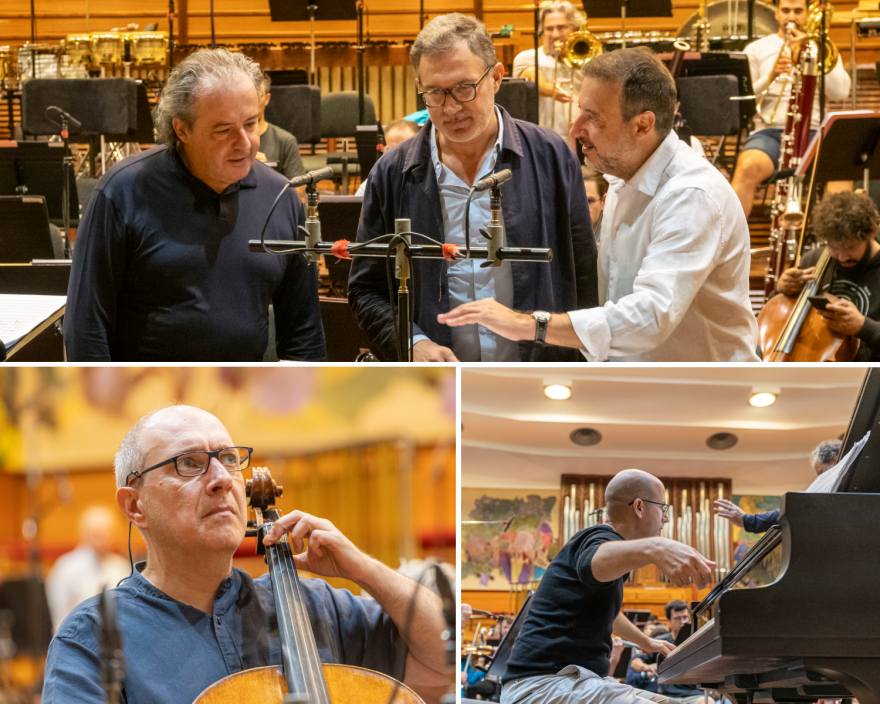
Juanjo Mena, Asier Polo, Alfonso Gómez, and Carlos Mena join the great line-up of artists currently recording three pieces from Bilbao-native composer Gabriel Erkoreka together with the Basque National Orchestra in Miramon. The recording will be made public in a few months.
In these initial time signatures of the new Season, the Basque National Orchestra is dedicating the coming days to recording an album at its Miramon home that will bring together three works from Bilbao-native Gabriel Erkoreka. For this purpose, regular orchestra collaborators, as well as internationally recognised and top-tier Basque artists have been brought together, and the result of this recording process will be reflected in the rich musical heritage that permeates this country.
Ekaitza, Piscis, and Tres sonetos para Michelangelo are three recent works from Gabriel Erkoreka’s composition catalogue that will now be brought together with this recording, which will conclude this Friday after various vigorous work days. Three works were conceived by Erkoreka for these three soloists, which they have premièred and now recorded. In addition, this recording has the great virtue of being created among good friends.
Good friends, great artists
Asier Polo at the head of cello concerto Ekaitza, Alfonso Gómez with the piano concerto Piscis, and Carlos Mena with Tres sonetos para Michelangelo take on this recording with great responsibility, knowing that this is the first reference recording of these pieces. This project’s musical direction is crowned by the work of director Juanjo Mena from Vitoria-Gasteiz, who is a connoisseur of all of these artists and the work of composer Gabriel Erkoreka himself, with this to say about this new project: “The performers are a sure thing, we have worked through it thoroughly, they are fantastic and directed by Juanjo Mena, who knows my music so well and has premièred a number of my pieces. There is a great deal of pent up emotion in this project”.
Musical heritage
This project is of great musical relevance and fully encompasses the essence and mission of the Basque National Orchestra to contribute to the spread of culture in Euskadi, telegraphing musical values abroad, and serving to stimulate and provide space for Basque performers and composers, while also being a backdrop for documenting our musical production through recordings. The Provincial Councils of Araba, Bizkaia, and Gipuzkoa are providing support for this recording, which will be made public in a few months.
Tickets for the 23-24 Season on sale
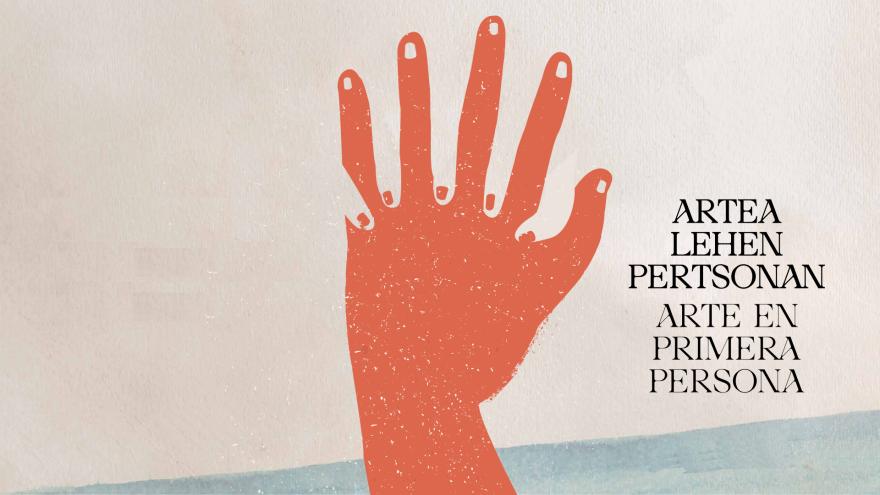
Tickets for all the 23-24 Season concerts are now on sale through the usual sales channels.
From 1 September tickets are on sale for the 23-24 Season concerts by the Basque National Orchestra, which will be held in the usual four Basque capital cities starting from 29 September in Vitoria-Gasteiz.
Tickets on sale starting at 10 euros
Tickets for all the concerts in Bilbao, San Sebastian, Vitoria-Gasteiz and Pamplona can be purchased on euskadikoorkestra.eus, as well as on the websites of the venues themselves (euskalduna.eus, kursaal.eus, principalantzokia.org and baluarte.com) and at the ticket booths and usual sales channels.
Requests for Season tickets can still be made here (starting at 80 euros).
Special prices and discounts
Basque National Orchestra season ticket holders, students, under-30s, over-65s, unemployed people and other groups (Artium, Kursaal Eszena…) can enjoy special prices when purchasing tickets. In addition, thanks to Última Hora Joven, people under the age of 30 can purchase tickets for all seat locations for 10 euros, 30 minutes before the start of the concert at the ticket booth of the corresponding concert venue.
23-24 Season: Art in the first person
In this new Season of Concerts by the Basque National Orchestra we want to draw attention to the human being who creates and transforms. We will focus on the active and responsible person who moves the world through their life experiences, sometimes spiritual and sometimes mundane.
With Mahler and his Symphony No. 3 we will see concepts such as eternity and love, and others such as the religious experience will be signed by Bruckner with his Symphony No. 7. In contrast to this more spiritual side, there are authors who, from disparate universes, give the widest possible palette of colours to private life and the mundane, such as Dutilleux, in his Correspondances, and Richard Strauss, in Aus Italien and in his Symphonia Domestica. Rachmaninoff allows himself to show in his Symphony No. 3 and his Piano Concerto No. 2 how heavily his nostalgia for his homeland weighs. Prokofiev's Alexander Nevsky represents the hero's exaltation, which could connect us with Dvorak in his Symphony No. 7 and the vindication of his people's struggle and longing. The concept of identity will find its ultimate expression in Rudi Stephan's opera Die ersten Menschen, which shatters us with a Freudian dissection of human nature after Adam and Eve's expulsion from Paradise.
All these very human concepts use art as an inspirational ally. Their maximum expression will be reached with a work commissioned to Antonio Lauzurika to commemorate the centenary of the birth of Eduardo Chillida. Another important commemoration will be the 75th anniversary of the Declaration of Human Rights and the first recitation in Basque of the texts that accompany Aaron Copland's work, which has become the anthem of the United Nations.
In this Season –and perhaps always in the Basque National Orchestra– the human being and art are in continuous reflection.
Robert Trevino will continue as the chief conductor of the Basque National Orchestra.
Expanded information about the 23-24 Season can be found here
The Basque National Orchestra kicks off the 23/24 Season with its participation at the Musical Fortnight presenting Mahler’s ‘Symphony of a Thousand’
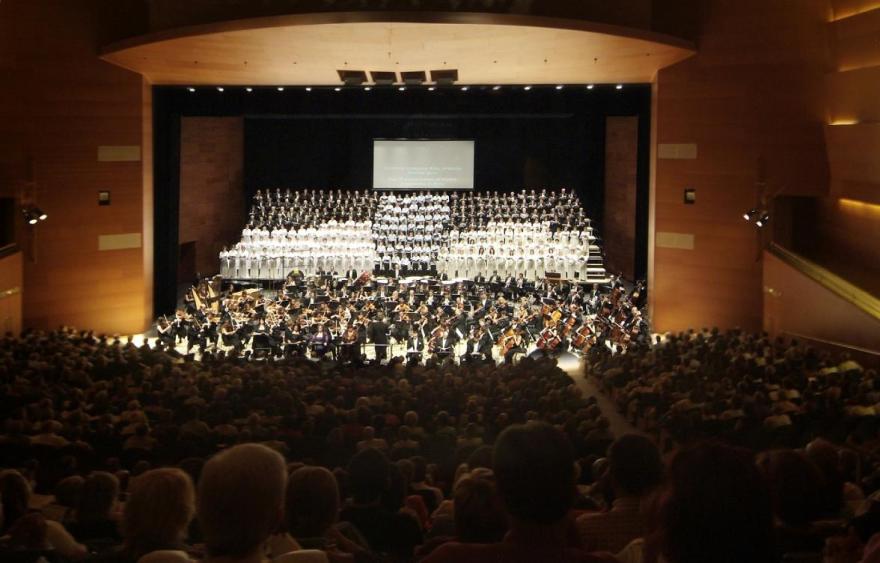
San Sebastian’s classical music festival will grace the Kursaal Auditorium stage on 18 August (20:00) under the direction of Robert Trevino, bringing together the Basque National Orchestra and the Navarre Symphony Orchestra for the instrumental portion, and the Orfeón Donostiarra, Orfeón Pamplonés, Easo Eskolania, and Easo Gazte for the choral passages, in addition to an extensive line-up of soloist voices.
Tremendous, titanic, immense, grandiose, gigantic, colossal, monumental, immeasurable, formidable, enormous... These are some of the adjectives that can be attributed to Gustav Mahler’s Symphony No.8, which will bring together more than four hundred performers on the Kursaal stage this 18 August (20:00). Tickets for this concert are sold out.
Although one of the most emblematic and ambitious pieces of one of the leading post-romanticism artists, it is rarely included in auditorium or festival programmes given its enormous magnitude. In fact, this is the second time that this symphony, also known as “Symphony of a Thousand” due to the necessary organic dimension, is being performed at the Musical Fortnight. The symphony is comprised of two parts with no resolved transition. The first part includes a religious hymn sung in Latin and, in the second part, the final scenes of Goethe’s “Faust” are sung in German. For its interpretation, the Fortnight has brought together the Basque National Orchestra and the Navarre Symphony Orchestra for the instrumental portion, and the Orfeón Donostiarra, Orfeón Pamplonés, Easo Eskolania, and Easo Gazte Abesbatza for the choral passages. The line-up of soloist voices includes sopranos Sarah Wegener, Mojca Erdmann, and San Sebastian-native Miren Urbieta-Vega; mezzo-soprano Justina Gringyte, contralto Claudia Huckle, tenor Aj Glueckert, baritone José Antonio López, and bass Mikhail Petrenko.
The week began with rehearsals of this grand production at the Basque National Orchestra’s home in Miramon, with the first meeting between the two orchestras under the command of Robert Trevino and the choirs joining in on these rehearsals soon.
A Season full of major dates for the Basque National Orchestra
As such, the Basque National Orchestra is kicking off a new Season full of musical events of great importance. The Season Concerts will begin on 29 September with Mahler’s Symphony No. 3, another grand one. Before this, between August and September, a series of recordings will be made, the Orchestra will participate in the second edition of the Arantzazu Festival organised by the Columbus Foundation with a double concert, and the traditional Concert & Screening will be held at the San Sebastian Velodrome within the framework of the San Sebastian International Film Festival. All information on the Basque National Orchestra’s upcoming dates can be found here.
More information
Musical Fortnight23/24 season: Art in the first person
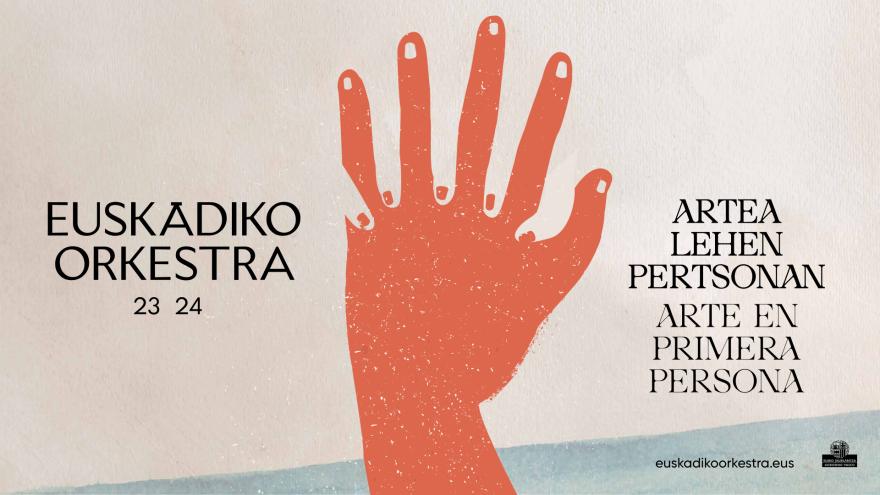
In this new Season, the Basque National Orchestra wishes to focus its attention on the human being who creates and transforms, through art as an inspirational ally. With Mahler and his Symphony No. 3 we will see concepts such as eternity and love; with Bruckner and his Seventh the most spiritual experience; with Dutilleux and Strauss the most mundane life; and with Prokofiev and his Alexander Nevsky the hero's exhilaration.
To this end this Season will feature great conductors such as Juraj Valcuha, Juanjo Mena, Marie Jacquot and Riccardo Frizza, as well as international artists of the stature of Alban Gerhardt, Sergey Khachatryan, Olesya Petrova and Justina Gringyte. Numerous performers and choirs from our region are part of the solid cast: Elena Sancho Pereg, Clara Mouriz, Alfonso Gómez, the Bilbao Choral Society, the Orfeón Donostiarra and Vocalia Taldea.
Basque creation will be of great importance, especially with the world première of Chillida – Elogios by Antonio Lauzurika, a work commissioned by the orchestra to commemorate the centenary of the sculptor's birth. Oihartzun gorriak by Itziar Viloria and a revision of At the Aegean Shores by Saskia Venegas will also première, and Mugarri by Ramon Lazkano will be performed. In this section of Basque creation, and outside the Season concerts, the recording of works by Gabriel Erkoreka that the orchestra will undertake under the baton of Juanjo Mena is also a standout feature.
For the first time in the Season Concerts, an opera will be performed that, programmed by the Arriaga Theatre and under the stage direction of Calixto Bieito, will be presented in Bilbao: Die Ersten Menschen (The First Humans) by Rudi Stephan.
After its successful tour of Poland, Austria will be the Basque National Orchestra's next international destination in February 2024, with three concerts in Salzburg and one in Linz.
Season Concert Programming
In this new Season of Concerts by the Basque National Orchestra we want to draw attention to the human being who creates and transforms. We will focus on the active and responsible person who moves the world through their life experiences, sometimes spiritual and sometimes mundane.
With Mahler and his Symphony No. 3 we will see concepts such as eternity and love, and others such as the religious experience will be signed by Bruckner with his Symphony No. 7. In contrast to this more spiritual side, there are authors who, from disparate universes, give the widest possible palette of colours to private life and the mundane, such as Dutilleux, in his Correspondances, and Richard Strauss, in Aus Italien and in his Symphonia Domestica. Rachmaninoff allows himself to show in his Symphony No. 3 and his Piano Concerto No. 2 how heavily his nostalgia for his homeland weighs. Prokofiev's Alexander Nevsky represents the hero's exaltation, which could connect us with Dvorak in his Symphony No. 7 and the vindication of his people's struggle and longing. The concept of identity will find its ultimate expression in Rudi Stephan's opera Die ersten Menschen, which shatters us with a Freudian dissection of human nature after Adam and Eve's expulsion from Paradise.
All these very human concepts use art as an inspirational ally. Their maximum expression will be reached with a work commissioned to Antonio Lauzurika to commemorate the centenary of the birth of Eduardo Chillida. Another important commemoration will be the 75th anniversary of the Declaration of Human Rights and the first recitation in Basque of the texts that accompany Aaron Copland's work, which has become the anthem of the United Nations.
In this Season –and perhaps always in the Basque National Orchestra– the human being and art are in continuous reflection.
The Basque National Orchestra’s 2023/2024 Season Concerts will begin on 29 September 2023 in Vitoria-Gasteiz, and will wrap up on 7 June 2024 in Donostia/San Sebastian. It will be a total of 12 season programmes which, distributed between Vitoria-Gasteiz (10), Bilbao (10), Donostia/San Sebastian (10x2) and Pamplona (10), add up to a total of 50 Season Concerts.
Great conductors, soloists and choirs
The orchestra will once again welcome a fair number of artists for its programme: eight conductors, nine instrumental and vocal soloists and three choirs. Vocals will have an important presence in this Season through solo singers and the three choirs.
CONDUCTORS. Robert Trevino will open and close the concert season and will direct a total of four programmes (see detail further below). For the rest of the programmes, the podium will be divided between Stanislav Kochanovsky, Riccardo Frizza, Marie Jacquot, Lina González-Granados and Baldur Brönnimann, who are making their début in the orchestra's Season, and Juanjo Mena, Juraj Valcuha and Pablo González, who are repeating.
SOLOISTS: In this section we will welcome for the first time Federico Colli and Markus Schirmer (piano), Sergey Khachatryan (violin) and Olesya Petrova (mezzo-soprano). Greats such as Alban Gerhardt (cello) and Justina Gringyte (mezzo-soprano) will be repeating. And we will give a special welcome to the Basque performers Alfonso Gómez (piano), Elena Sancho Pereg (soprano) and Clara Mouriz (mezzo-soprano).
CHOIRS: Vocals will play a special role this new Season and we will incorporate three Basque choirs: The Bilbao Choral Society, which will open the Season (Mahler's Third), the Orfeón Donostiarra (Prokofiev's Aleksander Nevsky) and Vocalia Taldea from Vitoria-Gasteiz (Debussy's Nocturnes).
Robert Trevino's seventh season as chief conductor
The orchestra's chief conductor will conduct four of the new Season's programmes. He will open it with one of the most symbolic works of the new Season, Mahler's Third, where he will introduce the women and children of the Bilbao Choral Society and mezzo-soprano Justina Gringyte. In February he will take on Rachmaninoff's Third and the première of Antonio Lauzurika's Chillida-Elogios. In April Trevino will conduct the Basque National Orchestra for the first time in an opera, entitled Die ersten Menschen, by Rudi Stephan. And he will close the Season with two works by Dutilleux (Correspondances) and Richard Strauss (Symphonia Domestica) that appeal to the most everyday and familiar version of earthly life.
Commitment to Basque creation
One of the key missions of the Basque National Orchestra is to promote and disseminate Basque creation through programming and recording. Contemporary works with a Basque signature will have a big presence in the programme of the 23/24 Season, with premières by authors such as Lauzurika, Viloria and Venegas as the main new proposals.
On the one hand, the Basque National Orchestra has commissioned Antonio Lauzurika to create a work to commemorate the centenary of Eduardo Chillida's birth, which he has entitled Chillida - Elogios. The Basque National Orchestra will be actively involved in this national celebration.
Another commissioned work to be premièred as part of our Concert Season will be Oihartzun gorriak by Itziar Viloria from Bizkaia. It is a joint commission with the Royal Philharmonic of Galicia, whose newly appointed chief conductor, Baldur Brönnimann, will be in charge of the première in spring 2024. The Basque National Orchestra thus repeats the shared commissioning formula it used last season with Gary Carpenter's Mamu kantak (Ghost Songs) ‒ on that occasion with several British orchestras.
Basque/Belgian composer Saskia Venegas closes the chapter of new Basque works with a revision of the work At the Aegean Shores, which talks about refugees in the Aegean Sea. This humanist argument is related to the concept of Human Rights, which in this season of the Basque National Orchestra has special significance. The piece was premièred at the last edition of Musikaste in Errenteria, but Venegas has rewritten it for the occasion.
Ramon Lazkano, a composer with whom Robert Trevino has established a strong connection since he arrived in the Basque Country in 2016, will also be present in our programme, as has been the case in recent seasons. So much so that he has taken his music to the music stands of other orchestras with which he works, such as the Orchestra Nazionale della RAI, which premièred Mugarri in March with Trevino. This time the Swiss conductor resident in Madrid, Baldur Brönnimann, will conduct this piece in Vitoria-Gasteiz.
In addition to the notable presence of contemporary Basque composers, worth mentioning is the Basque essence that permeates the third concert programme of the Season. Conducted by Juanjo Mena from Vitoria-Gasteiz, Ramuntcho by Gabriel Pierné, a work based on the book of the same name by Pierre Loti, which exalts the customs and regional typicality of the French Basque Country, and the Concerto in G Major by Maurice Ravel, our orchestra's flagship composer, will be performed.
In the section on recordings of Basque music, it is worth mentioning the recording of works by Gabriel Erkoreka that the orchestra will make under the Ondine label this season (see more information in the recordings section below).
First opera in our Season Concerts
Die ersten Menschen is an opera that premièred in Frankfurt in 1920. In 2021 it was performed at the Stopera in Amsterdam with stage direction by Calixto Bieito. And now it is coming to Bilbao thanks to the Arriaga Theatre. The work tears us apart with a Freudian dissection of human nature after Adam and Eve's expulsion from Paradise, according to the Genesis creation narrative. The scene is a spring landscape and the libretto can be described as psychological poetry. With Stephan we are looking for the identity of the human being.
Calixto Bieito is the stage director and Robert Trevino is the musical director.
Other orchestral activities
Austrian tour: Salzburg and Linz
The four-concert tour in the Polish cities of Warsaw, Wroclaw, Krakow and Katowice, held at the end of last March, was a turning point in the long international career of the Basque National Orchestra.
It now has a new international trip to Salzburg ahead of it, which it had to cancel last year due to the unexpected confinement of the entire Austrian country. Those concerts were postponed to February 2024. A total of three musical events will be held in Mozart's birthplace, and now there will also be another concert in Linz, where the orchestra last performed in 2018.
Recordings: Gabriel Erkoreka and Americascapes 2
Another important pillar of the orchestra's activity is its album recordings, a collection that will reach 80 volumes this Season, mainly centred on Basque creation. The next recording dedicated to Gabriel Erkoreka will be a musical event with an entirely Basque flavour and which, together with the Basque National Orchestra, will bring together Asier Polo (cello), Alfonso Gómez (piano) and Carlos Mena (countertenor), three performers conducted by Juanjo Mena, all of them Basque artists of international renown.
This album will be recorded by the Ondine label. In the last two years it has sealed its relationship with the Finnish factory through the recordings of the two Ravel albums and Americascapes. Ondine has an important worldwide distribution network, which has allowed the Basque National Orchestra to position itself in a market that is an international reference with reviews in the most prestigious specialised media (Gramophone, France Musique, BBC Music Magazine, Diapason, The New Yorker…). In addition to the monograph dedicated to Gabriel Erkoreka, the orchestra will tackle Americascapes 2 and hopes to follow in the footsteps of previous recordings.
Shared projects
The orchestra will maintain its commitment with the ABAO Bilbao Opera Season, Musika-Música in Bilbao, the Gala of the Frontiers of Knowledge Awards by the BBVA Foundation, the Musical Fortnight in Donostia/San Sebastian, Zinemaldia, Musikaste, the Columbus Foundation Festival by Viralgen, and other events.
The Orchestra’s Miramon Matinées and Musika Gela seasons will be presented in the future.
Season tickets and tickets
Booking of season tickets from 5 June onwards
After the renewal period for current season ticket holders, the sale of new season tickets will open. Bookings can be made from 5 June via euskadikoorkestra.eus, by calling 943 01 32 32 or by sending an email to abonatuak@euskadikoorkestra.eus. Season tickets will be formalised in order of receipt and subject to availability. The price of season tickets for 10 concerts ranges from €80 to €235.
Sale of single tickets from 1 September onwards
All tickets will be on sale starting from 1 September on euskadikoorkestra.eus and on the websites of the auditoriums and ticket booths.
Patronage
Patronage makes it possible for people who wish to help towards the development of this national cultural project to do so with their contributions. It is presented as a necessary long-term tool that complements the grants provided by the public administrations, and is being implemented as a way to contribute towards and develop culture and society. Contributions to the orchestra in any of the forms available will be eligible for tax deductions. More information on euskadikoorkestra.eus
Special thanks
Finally, the orchestra would like to express its gratitude for the significant collaboration and support received from all the entities that participate in the fulfilment of its different activities: its season ticket holders and the public in general, sponsoring and collaborating entities, cultural agents, communication media, etc., that make the Basque National Orchestra's activity possible.
The Basque National Orchestra seals its relationship with the prestigious Beethoven Festival in Poland
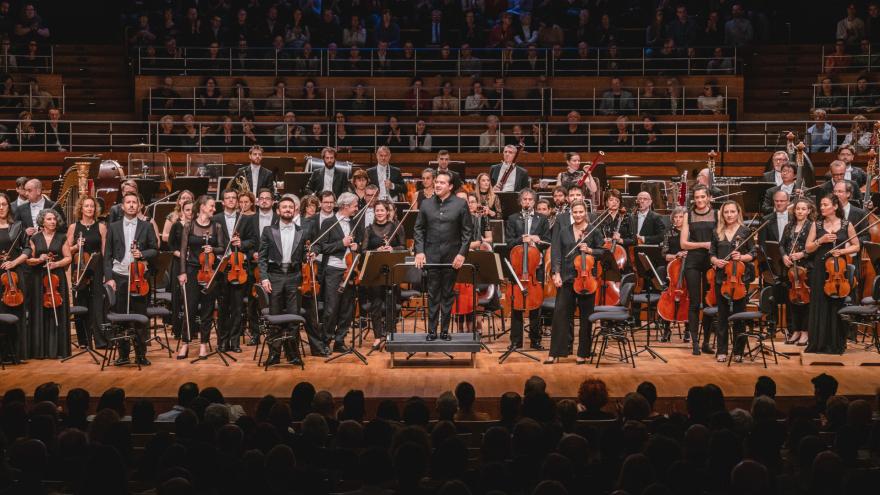
It is the result of a high-paced and artistically demanding tour that the Basque orchestra has managed with great solidity and high standards of quality.
"We have sealed the possibility of returning in the future", says Oriol Roch, general director of the Basque National Orchestra.
The Basque National Orchestra has had an international calling in its DNA since it was launched 41 years ago. During this time, it has travelled to many European countries and also to South American lands, but this new European departure, which makes it number 22, has been a turning point in its international career. Poland is an example of musical tradition with capital letters, a cradle of great artists, composers and centenary orchestras, and the Beethoven Festival, to which the orchestra has been invited as a result of its relationship with chief conductor Robert Trevino, has become, thanks to its founder Krzysztof Penderecki, one of the most important in Poland. The expectation to welcome the Basque National Orchestra was high and Warsaw, Wroclaw, Krakow and Katowice were already waiting with 5,400 tickets sold. With this background, the Basque National Orchestra not only could not fail, but also had to turn up with a demanding, high-level programme, and also pull it off with solvency.
A demanding programme
The programme designed for this presentation in Poland has been the same for all four concerts. As an opening, the popular and universal Boléro, signed by a composer, Ravel, that we claim as Basque and that the Basque National Orchestra has the power to show with an air and gaze of its own. And it is here that the orchestra has begun its conquest with the public, responding to Ravel's whims and knowing how to incorporate the different instrumental families in crescendo mode, as the score demands, always with great success and displaying the most Basque side of the composer. From the very first bars, with Ravel's Pavane pour une infante défunte as an overture, the Basque National Orchestra marked its territory and won over an expectant audience before whom it presented what was undoubtedly the main part of the concert, Mahler's complex Symphony No. 5. 70 minutes of score provide space to get to know the whole sonic universe of a composer, but also to test an orchestra's capacity. The challenge was great, but the Basque National Orchestra has met it with great solidity, confidence in its work, concentration and high standards of quality. The response of the audience with long standing ovations has had a big impact on the orchestra, which has responded with two and even three encores, completing almost three hours of concert in each city. Jesús Guridi's Amorosa, the Intermedio from Las Bodas de Luis Alonso by Gerónimo Giménez and Brahms' Hungarian Dance No. 5 were the scores that the orchestra kept on the lectern to close each evening and used to leave the audience with a historic memory.
In the words of Robert Trevino, "the musicians have huge doses of passion, power and enthusiasm. They have played this symphony four times in front of many people and have worked hard to achieve the best sound and depth in the performance. All this makes me very proud to be the chief conductor of the Basque National Orchestra. The orchestra has shown itself to be at a very high level".
After the Basque National Orchestra's visit to the cities of Warsaw, Wroclaw, Krakow and Katowice, "we can say that we have established an important relationship with the Beethoven Festival and that we have already sealed the possibility of returning in the future", says Oriol Roch, general director of the Basque National Orchestra.
Concert halls that combine tradition and modernity
The halls we have visited have been a combination of tradition and modernity. Warsaw and Krakow are historic places, the former rebuilt after World War II, the latter with centuries-old walls, and both steeped in the history of great composers and performers, legends who have woven the musical history of Poland and who enable us to live their tradition today with absolute respect and admiration. The auditoriums in Wroclaw and Katowice are also very important places built later, in avant-garde architecture, with the best acoustics and made into the best concert halls, it is said, in the whole world. The Basque National Orchestra has passed through these halls, marking a new international milestone and honouring its status as a Basque cultural ambassador.
Institutional representation, family and friends
Over the last few days, many people and institutional representatives have accompanied the Basque National Orchestra on its presentation in Poland. The Warsaw concert was attended by the president of the Beethoven Festival, Elzbieta Penderecka. The Basque Government's Minister of Health, Gotzone Sagardui, opened the Basque institutional representation in Warsaw together with Javier García Cogorro, CEO of Viralgen, the company sponsoring the concert in the Polish capital, where they carry out important work in the field of genetic research. The Krakow concert was attended by the Mayor of Krakow's Plenipotentiary for Culture, Robert Piaskowski; the Polish Consul in Burgos, Enrique de Villamor y Soraluce; the Director of the Cervantes Institute, Beatriz Hernanz; and Polish conductor Antoni Wit, for several years the chief conductor of the Navarre Symphony Orchestra and today honorary conductor of the Krakow Philharmonic Orchestra. Along with this representation, the Basque National Orchestra was also accompanied by countless relatives of its Polish musicians, numerous friends of members of the orchestra, as well as 'Basques around the world' and young people on Erasmus courses attracted by the presence of the Basque National Orchestra in their adopted Polish cities.
Katowice, end of the tour
The Basque National Orchestra ends its tour today in Katowice, an industrial city with a mining tradition that is home to one of the most important auditoriums with the best acoustics in Europe. It is there that the orchestra will seal this grand tour of four concerts in Poland, which will have an important place in its international history.
Photos from the tour
The Basque National Orchestra is making its debut in Poland with a great tour made up of four concerts
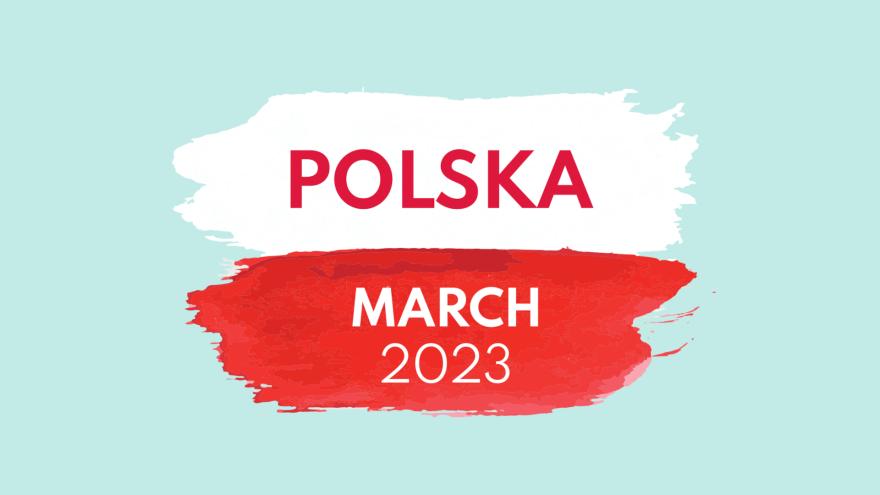
Invited to lead off the programming of the Beethoven Festival, one of the most important classical music festivals in Poland, the Basque National Orchestra is visiting Warsaw, Wrocław, Krakow, and Katowice –respectively– from March 28 to 31.
This is the first international tour since before the pandemic for the orchestra and it represents a historic presence in one of the cradles of European classical music.
The Beethoven Festival was founded in 1997 by composer Krzysztof Penderecki (who passed away three years ago) along with his wife Elzbieta Penderecka, who is now the president of the institution. Her long-standing relationship with main conductor Robert Trevino was key for the Basque National Orchestra to be invited to play at the Beethoven Easter Festival – an invitation that will take the orchestra to four of the most important musical cities in Poland: Warsaw, on March 28th; Wrocław, on the 29th; Krakow, on the 30th; and Katowice, on the 31st.
The Basque National Orchestra is the headliner for one of the most important classical music festivals of Poland. If you add up the capacity of the four auditoriums, the orchestra will perform before approximately 5,400 people, and tickets are practically sold out in all of the venues – a sign of the great expectation that the Basque National Orchestra has stirred since their visit was announced.
Robert Trevino at the helm of this new international challenge
Robert Trevino will lead this new international challenge for the Basque National Orchestra:
A very ambitious programme
The orchestra has prepared a very ambitious musical program (the same for all the cities) in which it will combine the Basque music of Ravel with Mahler.
Maurice Ravel is the orchestra's flagship composer as an example of Basque culture. The Basque National Orchestra has recently recorded two Ravel monographic albums with the prestigious Finnish label Ondine and under the direction of Robert Trevino. These albums include eleven of this composer from Ziburu's most important orchestral pieces. One of these pieces, Pavane pour une infante défunte, will open the concerts in Poland, to later move on to the interpretation of the famous Boléro, a world-renowned piece that the Basque National Orchestra has presented in recent times with a new angle – that of Ravel's purely Basque side.
The second part of the concerts features Symphony No. 5 by Gustav Mahler. This is a piece of great dimension and technical difficulty that the Basque National Orchestra has carefully prepared, as it was featured in their season concerts just a few weeks ago. Mahler holds a special place in Robert Trevino's heart and he is the composer with whom said conductor made his debut in 2018 with the Basque National Orchestra – also in Linz, Munich, and Bregenz (on that occasion with Symphony No. 4).
With this ambitious and complex programme, the Basque National Orchestra is aiming to act as a cultural ambassador for the Basque Country abroad, also wishing to showcase all its potential and strength so as to measure up against other great orchestras on the European circuit.
Travel plans and concerts
Before the orchestra goes on tour on Monday, March 27 (the eve of the opening concert in Warsaw), today, Friday, March 24, the last rehearsal is taking place. Juanjo Ocón has taken the baton these previous days of rehearsal, but it will be the main conductor Robert Trevino who will take command once in Poland.
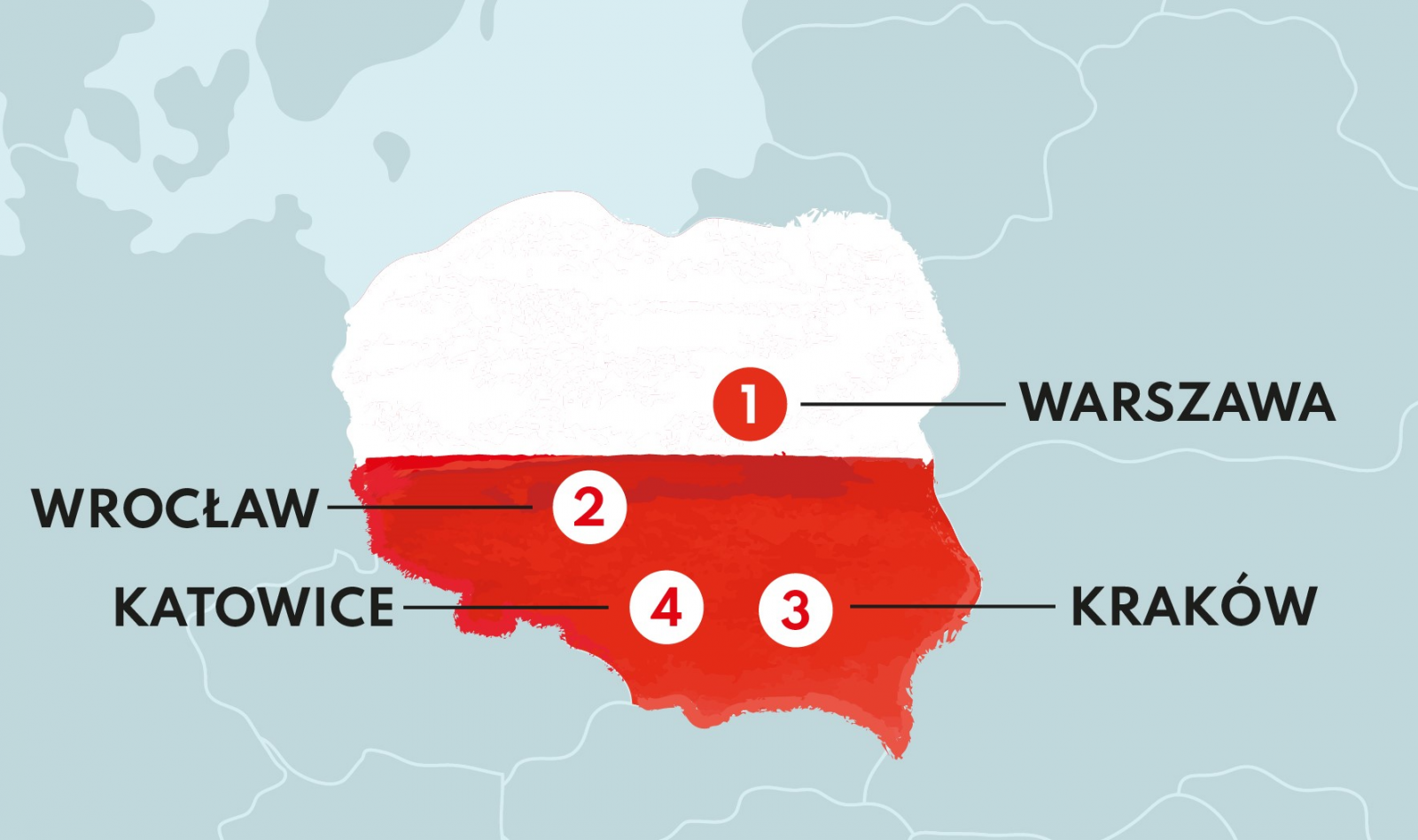
Below are the dates, cities, and auditoriums where the Basque National Orchestra will offer concerts next week:
- Tuesday, March 28 (7:30 p.m.), Warsaw, National Philharmonic (1,072 tickets available).
Warsaw is the hometown of Frederic Chopin, one of the most important composers in history. The composer's prestigious International Piano Competition is held here. It is also the headquarters of the Warsaw National Philharmonic Orchestra, a century-old institution whose current main conductor is Andrey Boreyko, the Basque National Orchestra's main guest conductor between 2009 and 2017. The tour gets its start at the legendary Warsaw National Philharmonic Hall – a place steeped in history.
- Wednesday, March 29 (19:00), Wrocław, Narodowe Forum Muzyki (1,800 tickets available).
Narodowe Forum Muzyki (the National Forum of Music), one of the largest and most modern venues in the country, hosts concerts by world-renowned orchestras and famed soloists and conductors. Wrocław has a recent history that features common ties with us, as it shared the title of 2016 European Capital of Culture with San Sebastián and, since then, both cities have been very close, especially on the artistic/cultural level.
- Thursday, March 30 (7:00 p.m.), Krakow, Philharmonic Concert Hall (720 tickets available).
The third stop of the tour will take place in one of the largest, oldest, and most important cities in Poland. The auditorium, with its long-standing tradition, is the headquarters of the hundred-year-old Krakow Philharmonic Orchestra.
- Friday, March 31 (7:30 p.m.), Katowice, NOSPR (1,800 tickets available).
The orchestra ends its tour with this fourth concert in Poland, in a city with marked mining activity. It is home to one of the largest and most modern auditoriums in Poland, the headquarters of the National Polish Radio Symphony Orchestra (NOSPR).
International presence of the Basque National Orchestra
The Basque National Orchestra is an organisation that is always true to its vocation to be an ambassador of Basque culture. For this reason, and throughout its 41-year history, the orchestra has been present on international stages in different ways and with different objectives.
It has done so in Festival and Seasons like the Biennale di Venezia and L'Opéra Royal du Château of Versalles. It has also participated in exchanges with other orchestras, such as the exchanges with the Düsseldorf Symphony and the Giuseppe Verdi Conservatory of Milan, as well as the classical exchange with the Orchestre National Bordeaux Aquitaine (ONBA).
Having said that, the orchestra's best-known format is that of concert tours, with this tour being its 22nd international tour. Since 1984, the Orchestra has toured Central European countries immersed in history such as Austria, Germany, Italy, France, and the United Kingdom, and it has crossed the pond and landed at the Colón Theatre of Buenos Aires (Argentina), Santiago de Chile (Chile), and Sao Paulo (Brazil), among others. Now, the musical formation is focused on what may be one of its biggest milestones of the many international tours that it has been on in the past.
The Basque National Orchestra and Robert Trevino launch to the international market their new album, ‘Ravel 2’
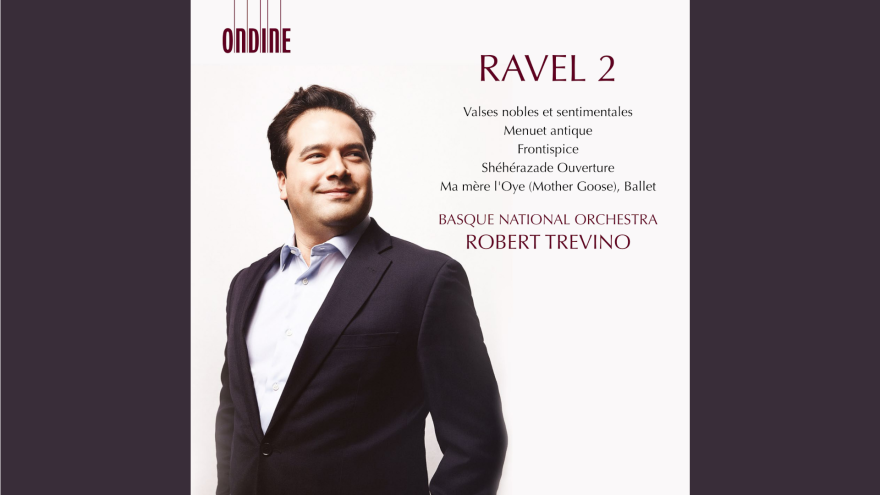
The Ondine record label signs this album that includes the world's first recording of the orchestration by Pierre Boulez for the work ‘Frontispice’, as well as a complete recording of the ballet score ‘Ma mére l’Oye’.
It has already received the recognition of "excellent album" in the prestigious Gramophone Magazine. The album is available on all the main digital platforms.
Ravel 2 arrives after the huge success achieved with the first album dedicated to the composer from Ziburu. The first recording, focused on his more Basque production, included his most well-known works and has received the highest praise and glowing reviews in specialised media across the world. Ravel 2 focuses on the French side of this composer's work. The album, like the previous one recorded with the Ondine record label, includes the world's first recording of the orchestration for Frontispice by French composer and conductor Pierre Boulez, as well as a complete recording of the ballet score Ma mère l'Oye. Valses nobles et sentimentales, Menuet Antique and Shéhérezade (Ouverture de féerie) complete this new recording launched on 4 November to the international market. This recording, with a duration of 70 minutes, was made in December 2021 at the Basque National Orchestra's headquarters in Miramon.
As described by the chief conductor of the Basque National Orchestra, Robert Trevino, in the booklet of the new album: “The first Ravel album I recorded with the Basque National Orchestra concentrated on the works that show the composer's Spanish-Basque facet. In this volume, the music material is not so explicitly Basque, in terms of the tempos or having been written in Basque towns or cities. However, it is the continuation of our exploration of the work by a great Basque composer, with whose music the Basque National Orchestra has had a long relationship. This time, the repertoire shows Ravel’s French side to a larger extent” (see Robert Trevino’s complete notes below).
Since he began his role as chief conductor Robert Trevino has sought to explore in depth Ravel’s Basque identity, and share with the world what the Basque National Orchestra knows and understands about this composer’s language. And he has been doing this throughout his five years at the helm of the orchestra. To mention a few milestones linked to Ravel during his tenure as chief conductor, Trevino and the Basque National Orchestra have presented Ravel's music in several Season programmes, as well as at the prestigious Théâtre des Champs-Élysées in Paris, where the orchestra made its first performance in early 2020. Now, these two recent recordings with Ondine are also joined by a tour in Poland planned for March 2023, where the chief conductor and orchestra will travel to with Ravel's Boléro.
International success of the recordings with Ondine
This is the third recording that the Basque National Orchestra and Robert Trevino make together with the prestigious Finnish Ondine label, which belongs to the Naxos group. The prestigious classical music magazine Gramophone has already published the first review received by this new record and has described it as an “excellent album”.
The first album, Ravel, received praise and acknowledgements such as ‘Recording of the Month’ from the main media in places such as Japan, Australia, France and the USA; as well as five-star reviews in reputable publications such as Classica and Classics Today. Later, the orchestra made another recording with Ondine entitled Americascapes and focused on little-known American composers. This recording has also received similar recognition, including a nomination for the Gramophone for ‘Best Orchestral Recording', ‘Recording of the Year 2021’ from Presto Music (United Kingdom), ‘Recording of the Month’ from PhonoForum, ‘Recording of the Month’ from Limelight and five stars from Classics Today and Classica. Alex Ross, from The New Yorker, praised both albums as "surprisingly excellent” and “superb”.
Where to get the album ‘Ravel 2’
The album can be obtained in physical format upon request at retailers and is available on the main digital platforms such as Spotify, Apple Music, iTunes, etc.
Complete notes by Robert Trevino on ‘Ravel 2’
In my first Ravel album with the Basque National Orchestra, we focused on works that display the Spanish-Basque side of the French-Basque composer (Ravel was born in Ciboure, in the French side of the Basque Country, and many of his works incorporate aspects of Basque culture). In this volume, the musical material is not so explicitly Basque – In terms of specific Basque rhythms, or having been written in the Basque towns or cities. But it is a continuation of our exploration of an oeuvre by a great Basque composer, with whose music the Basque National Orchestra has a long relationship. The repertoire this time around represents much more of the French side of Ravel’s French-Basqueness; from Ma mère l ´Oye being expanded into a ballet, and Shéhérazade being composed in an ornate, French impressionist style.
Frontispice is a particularly interesting inclusion in this respect, because it’s a very unusual three-minute piece, originally for two pianos, which is really conceptual, modernist French music, in many ways much closer to the music of Messiaen than to Debussy. And this arrangement that we’ve recorded was orchestrated by that preeminent Ravel champion and great French conductor, Pierre Boulez.
So whereas our first album was a statement of Ravel’s Basqueness, this one respects the fact that he is also French. The Valses nobles et sentimentales is another good instance – In contrast to the savagery of La Valse, which was included in volume one, Valses nobles et sentimentales is a rambunctious but extremely elegant set of waltzes, of the kind that one might have heard in Paris, with influences pouring in from Vienna. When I listen to this work I always feel that I am somewhere around Montmartre!
Incidentally, this complex mesh of French and Basque influences in Ravel is echoed in the Basque Country itself – where we feel a great kinship with the French (if you boat down the canal in San Sebastian you could easily find yourself reminiscing about the Seine, with its grey rooftops to your side) – and in our orchestra, many of whose musicians were trained in Paris. So naturally the French tradition from the Paris Conservatoire is felt in the orchestra, and in Basque composers such as Ramon Lazkano or José Maria Usandizaga. Many of our musicians also live across the border in France and commute across this very dynamic frontier between France and Spain. Ravel operated in that same space, feeling the same gravitational pulls of the Iberian Peninsula and France. And even at his most French, Ravel’s music often still has a directness, a concision and a solidity that I find rather Basque in nature.

